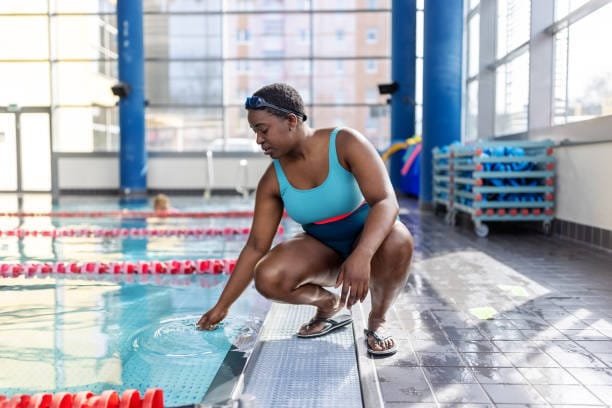- L-Plate Retiree
- Posts
- Stop Overthinking and Just Jump: Retirement Lessons from the Pool
Stop Overthinking and Just Jump: Retirement Lessons from the Pool
Why circling the edge won’t bring certainty — and how diving in builds confidence for work, life, and retirement.

because retirement doesn’t come with a manual


taking the plunge isn’t always easy
I listened to an episode of the Mind Shift podcast called How to Stop Overthinking: The Power of Decision this week. Honestly I was expecting the usual advice about “calming your mind” — maybe a gentle reminder to try yoga, or a pep talk about slowing down.
What I got instead was something that felt far more practical: a conversation about fear, indecision, and the weird comfort of staying stuck.
The hosts made the point that overthinking isn’t the same as deep thinking. It’s fear in disguise. It feels like we’re being thorough, responsible, careful — but really we’re just circling. Running loops in our heads while convincing ourselves we’re making progress.
The picture that popped into my head was a swimming pool. Especially an outdoor in the middle of winter. (ok, Melbourne Australia kind of winter - nothing freezes over but it’s cold nonetheless) You know the routine. You stand at the edge, dip a toe, pace around, dip the other toe, tell yourself you’ll get in “in a minute.” You want to swim. You even came dressed for it. But you hesitate, shivering in the shade while other people are already splashing about.
That’s what overthinking feels like. And I realised, I’ve been doing it more than I’d like to admit.
I’m still working, still in the rhythm of employment, but retirement is no longer just a hazy speck on the horizon. It’s there, looming closer. And suddenly I’m the person pacing around the pool.
What if I invest wrong?
What if the market tanks the year I finally call it quits?
What if I haven’t saved enough, even though I thought I had?
What if I’m financially free but bored stiff?
What if my body calls time just as I get the freedom I’ve been waiting for?
It’s easy to stall. To tell yourself you’re “being sensible.” To check the numbers one more time, tweak the portfolio, run the retirement calculator again. Just as easy to circle the water, convincing yourself that waiting will make the dive easier. (Spoiler: it doesn’t.)
And if you’re already retired? The questions don’t go away — they just change shape.
Should I downsize now, or wait?
Should I start drawing down, or keep reinvesting?
Should I travel while I’m still fit, or stay cautious in case something goes wrong?
What if I finally relax, only to discover I don’t quite know who I am without the structure of work?
The Mind Shift conversation hit home because it named the truth: overthinking gives us the illusion of control, but mostly it just wastes time. The cure isn’t more thought. The cure is decision.
Clarity comes from motion. Confidence comes from doing.
Not perfectly. Just repeatedly.
It’s the same as swimming. The water always feels cold when you first jump in. Always. No amount of toe-dipping changes that. But the sooner you get in, the sooner your body adjusts, and the sooner you’re actually enjoying yourself instead of pacing around in indecision.
That was my lightbulb moment. Every time I open my investment dashboard and don’t fiddle with it — that’s a quiet win. Every time I drag myself out for a run before my brain has the chance to debate it — another win. Every time I choose to enjoy a Saturday rather than strategise my retirement with military precision — win again.
Planning has its place. Of course it does. But waiting for certainty is like waiting for pool water to feel warm from the edge. You’ll wait forever.
So this weekend I’m going to practice jumping sooner. Deciding without demanding perfect clarity. Booking the trip without reading all 327 reviews. Cooking something without trawling three recipe sites. Hitting “send” without rewriting the email ten times.
Because in the end, the pool was never meant to be observed from the side-lines. It was meant to be swum in.
Here’s to fewer loops, more leaps, and the refreshing shock of diving straight in.
Your Turn:
What “pool” are you still circling — and what’s stopping you from jumping?
If you’re already retired, are you diving in… or still dangling your legs on the edge?
When was the last time you cannonballed into something and thought, “Why on earth did I wait so long?”
I’d love to hear your stories — hit reply or drop a comment and let me know. And if you’ve got a friend still pacing around their own metaphorical pool, feel free to share this with them too.
The L-Plate Retiree Newsletter is published Monday through Friday, with Weekend Musings on weekends. Forward this to someone who needs permission to try something new.
Wall Street’s Morning Edge.
Investing isn’t about chasing headlines — it’s about clarity. In a world of hype and hot takes, The Daily Upside delivers real value: sharp, trustworthy insights on markets, business, and the economy, written by former bankers and seasoned financial journalists.
That’s why over 1 million investors — from Wall Street pros to Main Street portfolio managers — start their day with The Daily Upside.
Invest better. Read The Daily Upside.

The Risk-Return Reality Check

spectacular vistas is the reward for taking the risk to climb a mountain
Here's something that might burst your bubble: there's no such thing as high returns with low risk. If someone promises you guaranteed 15% annual returns with no downside, they're either lying or selling you something that will end badly.
This isn't pessimism—it's the fundamental law of investing that governs every market from Singapore to Stockholm. The potential return on any investment is directly related to the level of risk you're taking. Want higher returns? You'll need to accept higher risk. It's that simple, and that universal.
Think of it like climbing a mountain. You can stay safely at base camp with a guaranteed modest view, or venture higher for spectacular vistas—but only if you're prepared for steeper paths and unpredictable weather. The choice is yours, but you can't have the mountaintop view with base camp safety.
This relationship exists because of human nature. If a truly safe investment offered high returns, everyone would pile into it, driving up the price and reducing future returns until the balance was restored. The market has millions of participants constantly searching for these opportunities, which means they disappear quickly.
The risk-free rate—usually short-term government bonds from stable countries—serves as the foundation for all other investments. Everything else must offer more return to compensate for additional risk. This "risk premium" is your reward for accepting uncertainty.
Understanding this relationship helps you set realistic expectations and avoid get-rich-quick schemes. The numbers vary by region—developed markets offer lower risk premiums but more stability, while emerging markets offer higher potential returns with more volatility.
L-Plate Takeaway: The investment world doesn't offer free lunches. Every extra percentage point of return comes with a price tag—usually volatility or uncertainty. Your job isn't to eliminate risk (impossible), but to take the right amount for your situation. Before chasing higher returns, ask yourself: "Am I prepared for the bumpy ride that comes with them?"
Subscribe now to receive weekly insights, practical tips, and occasional humour to help you prepare for or thrive in retirement. Unlike those other financial newsletters that seem written for people who already understand everything, we speak human here. No jargon without explanation, no assuming you've been investing since kindergarten.
Become one of our founding subscribers who are refusing to let retirement happen to them—they're happening to retirement instead! Being part of something from the beginning means you'll help shape where we go next.
Because retirement doesn't come with a manual... but now it does come with this newsletter.
The L-Plate Retiree Team
(Disclaimer: While we love a good laugh, the information in this newsletter is for general informational and entertainment purposes only, and does not constitute financial, health, or any other professional advice. Always consult with a qualified professional before making any decisions about your retirement, finances, or health.)

Reply